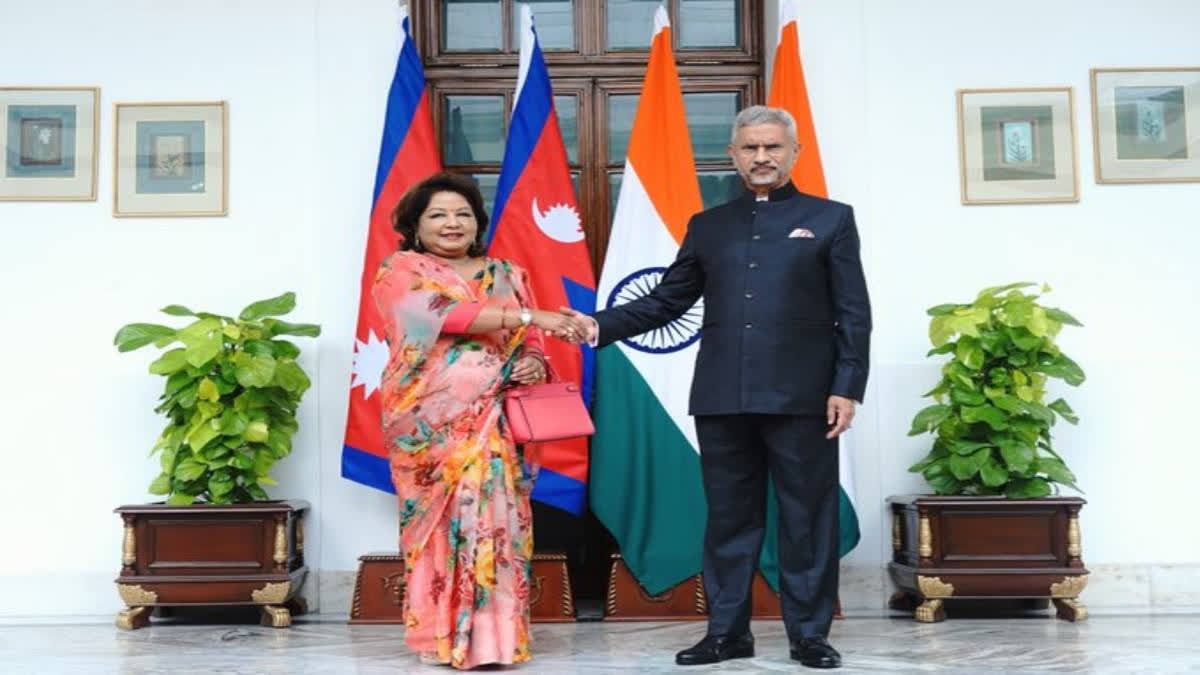New Delhi: India's diplomatic schedule is packed this month with numerous foreign delegates visiting the country. Among them, Nepal's Foreign Minister, Dr Arzu Rana Deuba, is currently in New Delhi on an official visit from August 18 to 22, at the invitation of External Affairs Minister (EAM) Dr S Jaishankar. She is scheduled to meet with Dr. Jaishankar later today. This marks her first visit to India since assuming office. Her visit follows Foreign Secretary Vikram Misri's recent trip to Kathmandu just a week ago.
The visit of the Foreign Minister is in keeping with the tradition of regular high-level exchanges between India and Nepal. Nepal is India's priority partner in its Neighbourhood First policy. The visit will allow both sides to discuss and review the progress in bilateral cooperation and help advance the ties further. The meeting between the Nepalese Foreign Minister and EAM Jaishankar will focus on exploring ways to enhance and expand the bilateral relationship between India and Nepal.
Taking to X (formerly Twitter), EAM Jaishankar said, "Welcome Arzu Deuba of Nepalon her first visit to India as foreign minister. Looking forward to our talks".
India's former ambassador Anil Trigunayat said, "India and Nepal are civilizational ties driven by national interest, hence, I don't see any significant diversion or dilution of India's importance in their scheme of things. Commenting on the visit, the expert noted that these are ongoing interactions and that many development projects in Nepal require frequent and timely consultations at all levels. Indian Foreign Secretary was recently there and the Foreign Minister might discuss the visit and outcomes of the visit of her Prime Minister to India soon.
When asked as to the nature of the India-Nepal relationship as far as China's influence in the region is concerned, Trigunayat said, "As far as China is concerned it will be our challenge in every geography, but given the benign approach against the wolf warrior and debt diplomacy I am confident our friends in the neighbourhood will distinguish what is better for them and facts are on the ground for everyone to see".
It is pertinent to note that despite the change in political dynamics in Nepal, India's foreign policy towards Nepal has always remained unchanged.
India and Nepal share a deep historical, cultural and geographical relationship, making their strategic ties quite significant. Both countries share strong historical, cultural and religious ties, including common cultural festivals, traditions and religious practices. Nepal is landlocked and located between India and China. Its geographical position makes it strategically important for India’s security and regional influence. India is concerned about potential security threats from China. Nepal's proximity to China and its strategic location in the Himalayas make its political stability and alignment crucial for India.
India is Nepal's largest trading partner and a major source of foreign investment. The two countries have numerous trade agreements to facilitate bilateral trade. India substantially aids Nepal in various sectors, including infrastructure, health, education and disaster relief.
The two countries have several agreements covering trade, transit and cooperation in various fields. The Treaty of Peace and Friendship, signed in 1950, is a cornerstone of their bilateral relations. While there is a strong strategic partnership, there are occasional disputes, such as border issues. The governments often engage in dialogue to resolve these disputes amicably. India and Nepal have strong defence ties, including military training and joint exercises. The Indian Army and Nepalese Army frequently collaborate on various security issues. Both countries work together to address regional security challenges, including counter-terrorism and border management.
Nepal’s relationship with China has grown in recent years, leading to some tension with India. However, both India and Nepal have been working to balance these relationships to maintain stability and cooperation in the region. The strategic relationship between India and Nepal is multifaceted, involving historical connections, economic cooperation, and security considerations. Despite occasional challenges, the countries generally maintain a strong partnership and work together to address regional issues and enhance their mutual interests.
The India-Nepal border issue is a complex and longstanding matter involving historical, political and geographical factors. This treaty, signed between the British East India Company and the Kingdom of Nepal, marked the beginning of modern borders. It defined the boundary between British India and Nepal, but left some areas ambiguous. Kalapani, Limpiyadhura and Lipulekh-these regions have been contentious, especially as their location has been debated.
They are situated in the northwestern part of Nepal, where the borders of India and China intersect. The dispute gained prominence when India inaugurated a new road to the Lipulekh Pass in May 2020. Nepal objected, claiming that the road passed through territory it considers its own. This led to a diplomatic standoff and increased tensions.
In response to the road inauguration, Nepal updated its political map in May 2020 to include Kalapani, Limpiyadhura and Lipulekh as part of its territory. India rejected this new map, stating that the areas are part of its territory. Both countries have held several rounds of discussions to resolve the issue. Various high-level meetings and diplomatic channels have been utilised, but a definitive resolution has yet to be achieved.
There are differing interpretations of historical treaties and maps, leading to conflicting claims over the exact location of the border. The regions in question are strategically significant, particularly because of their proximity to the India-China border. Control over these areas has implications for regional security and access. Both countries have strong national sentiments attached to the disputed areas, which complicates the diplomatic negotiations. Both countries expressed a commitment to resolving the dispute through dialogue, but a definitive resolution has not yet been reached.
Read more: Shankar Sharma's Reappointment As Envoy To India: Politics In Nepal’s Diplomacy



